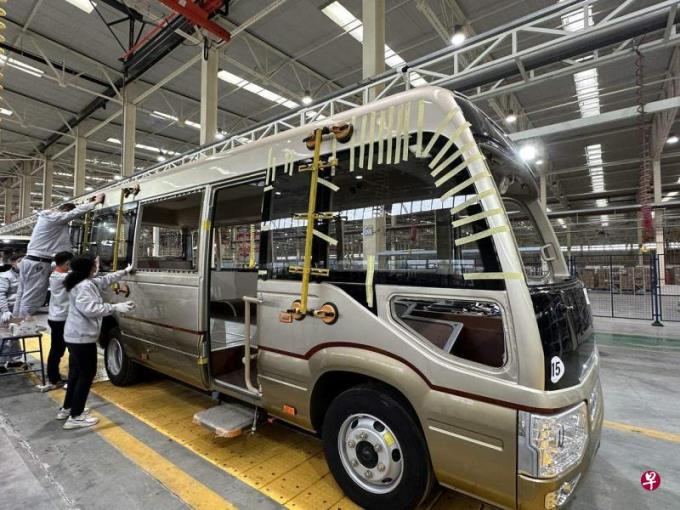
The machine roar in the assembly workshop of Xiangyang Tenglong Motor Company, Hubei, and the workers are delivering work to a double -growing electric vehicle order.
Zhou Shengming, deputy general manager of Tenglong Automobile, told Lianhe Zaobao that the company has received at least 1,000 vehicle export orders this year, more than three times last year.The company is mainly for the export of electric buses in Southeast Asian markets such as Myanmar, Thailand, Laos, and has begun to expand Russian and Middle East customers this year."This May, we have received three batches of foreign customers visited."
As China's exports have been weakened by the global economy, the export of electric vehicles has grown rapidly, becoming a new driving force for the overall export.According to data on the China Passenger Vehicle Market Information Joint Information, the number of new energy vehicles exported in April reached 91,000, an increase of 1028.5 % year -on -year, an increase of 29.4 % month -on -month.
China ’s automobile export volume exceeded the 3 million mark last year, surpassing Germany to become the world’ s second largest car exporter.Cui Dongshu, Secretary -General of the Federation, pointed out that the important reason for China's export growth in the past two years is that the exports of new energy vehicles have increased, and the number and average exports have increased strongly.
As the Chinese government's subsidy policy for electric vehicles exit at the end of last year, the growth rate of China's electric vehicle market has slowed significantly this year, and the year -on -year increase in retail volume has decreased from 146.6 % in the first quarter of last year to 22.4 % in the first quarter of this year.At the same time, the Reese's strategic consultation report shows that more than 40 car brands have launched subsidies or price reductions in the first quarter, and the price war is becoming more and more enthusiastic.
The increasingly fierce domestic market competition has prompted Chinese electric vehicle companies to accelerate the pace of going abroad. Europe and Southeast Asia have become the preferred market for many car companies.Some Chinese electric vehicle companies have entered the international market and their results are bright.
The data provided by the leading electric vehicle company BYD to this newspaper shows that the Group's exported passenger cars in the first four months of this year was 53,550, which has reached 95 % of the export volume last year.Last year, BYD passenger cars mainly included Norway, Germany, the Netherlands, Colombia, Brazil, Thailand, Singapore, and Australia. This year, it has opened sales in Britain, Spain, Jordan, Ecuador and other places.
Luo Hao, Assistant General Manager of the BYD Brand and Public Relations Division, introduced that in recent years, many European countries have introduced new energy vehicle support policies.Increased to 15 million vehicles, France will achieve the goal of all cars as electric vehicles in 2035."In this context, the demand for the new energy vehicle market will continue to grow."
NIO, which focuses on high -end passenger cars, entered the Norwegian market in 2021. In October last year, it further expanded to Germany, the Netherlands, Denmark and Sweden.Different from other electric vehicle companies, Weilai is not sold through agents, but has built self -built charging piles, power stations and Weilai Center to copy the full operating system of the Chinese market overseas.
Qin Lihong, co -founder and president of Weilai Automobile, said in an interview that during the global development, Weilai insisted on the localization of all departments.In the early stage of entering the European market, the group will focus on infrastructure construction and continue to improve the satisfaction of European users.
Compared with Europe, as the world's second largest electric vehicle market, Southeast Asia's electric vehicle penetration rate is only slightly higher than 1 %, but the industry is optimistic about this vast market potential with nearly 700 million people.Zhou Shengming pointed out that the pace of urbanization of multiple Southeast Asian countries has accelerated, and the demand for commutes and short -distance tourism has continued to expand. The company is “expected to usher in explosive growth this year.
The huge electric vehicle market opportunities have also promoted traditional car companies to accelerate electrification.The German BMW Group disclosed the plan to put into production in Shenyang in Shenyang last week. The Chinese car company "One Brother" SAIC Group announced last month that it would build a new energy industrial park in Thailand to help the company improve the overseas electric vehicle industry chain.
As the world's largest lithium battery production country, China has a huge cost advantage in the field of electric vehicle production.However, Luo Hao admits that as more and more global brands enter the electric vehicle market and even build factories in various places, the market competition is "not intense."In addition, uncertainties such as the global macroeconomic situation and the price of power battery raw materials have constituted potential risks to electric vehicle exports.
Lin Dawei, a senior researcher at the East Asian Research Institute of Singapore National University, analyzed in an analysis in an interview that under the intensification of China and the United States, the United States is advocating "Friend-SHORING" to create a supply chain with allies such as South Korea and Australia.Increasing power battery production may shake China's dominant position in the battery field.
On the other hand, with the evolution of electric vehicles in the direction of unmanned driving, the future development of the industry will depend on how powerful the chip as a "brain" is.Under the crosses of the chip Alliance (CHIP 4) of the US -Japan -South Korea, whether China can independently develop chips comparable to Qualcomm and TSMC, determine the upper limit of China's electric vehicle.
Although the resistance of China's electric vehicles has continued to increase, Lin Dawei believes that as the total population of China decreases and aging aging, the domestic market will become increasingly saturated."The long -term development of China's electric vehicles will definitely rely on the export market, especially the growth of the development markets such as Southeast Asia and Africa."


